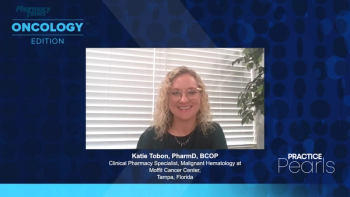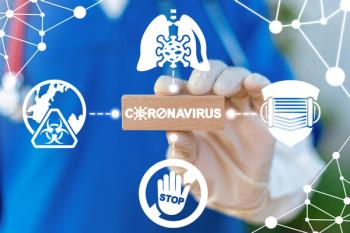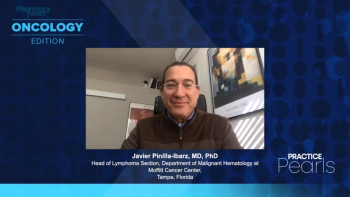
S. Diane Yamada, MD, president of the Society of Gynecologic Oncology (SGO), discusses the role of the pharmacist in gynecologic oncology patient care and treatment.

S. Diane Yamada, MD, president of the Society of Gynecologic Oncology (SGO), discusses the role of the pharmacist in gynecologic oncology patient care and treatment.

Pharmacy Times spoke to Seth DePasquale, RPh, BCSCP, senior director of hospital and health systems at Visante, about his session at the APhA 2022 Annual Meeting & Exposition, titled "Keeping Up with USP 800."

Bhavesh Shah, RPh, BCOP, and Ryan Jacobs, MD, discuss emerging agents in the pipeline and the future treatment landscape for CLL.

Shannon Hough, director of ClinReview and Clinical Content for McKesson, discusses the advantages of including pharmacy staff as part of the care team when payer or drug availability challenges arise.

Ryan Jacobs, MD, and Bhavesh Shah, RPh, BCOP, comment on the role of pharmacists in clinical practice for managing patients with CLL.

Michele Belcher, president of the National Community Pharmacists Association, and pharmacist and pharmacy owner at Grants Pass Pharmacy, discusses ways of transforming the pharmacy profession’s current challenges into opportunities for positive change for the profession.

Michael Abrams, MPH, PhD, senior health researcher at Public Citizen’s Health Research Group, discusses actions needed to help manage the opioid epidemic in the country.

S. Diane Yamada, MD, president of the Society of Gynecologic Oncology (SGO), discusses some key developments in the field of gynecologic oncology that will be on the agenda at the SGO 2022 annual meeting.

Jeffrey B. Simon, JD, co-chair of the National Opioid Litigation Conference, discusses the historic settlement in a multi-district opioid lawsuit in Texas.

Pharmacy Times spoke with students at the Idaho State University College of Pharmacy and its partner program at the University of Alaska Anchorage College of Health.

Carlie Traylor, PharmD, discussed the Community Pharmacy Fellowship from the National Community Pharmacists Association and CPESN.

Katie Tobon, PharmD, BCOP, leads the discussion comparing dosing and drug interactions among the FDA-approved BTK inhibitors ibrutinib and acalabrutinib for the treatment of CLL.

Dr. Seiko Diane Yamada, MD, the 53rd president of Society of Gynecologic Oncology (SGO), discussed her goals for SGO during her tenure.

Al Carter, MS, PharmD, RPh, discussed the Buying Medication Safely Campaign from the National Association of Boards of Pharmacy.

Michael Abrams, MPH, PhD, senior health researcher at Public Citizen’s Health Research Group, discusses whether classification of gabapentin as schedule V would end patients’ access to the drug.

Key opinion leaders in hematology-oncology share recommendations on switching from first-generation BTK inhibitors to next-generation BTK inhibitors for the management of patients with CLL.

Dr Ryan Jacobs, MD, leads a review of the phase 3 SEQUOIA trial presented at ASH 2021 evaluating the use of zanubrutinib for previously untreated CLL and discusses the management of adverse events with BTK inhibitors.

Ryan Jacobs, MD, and Bhavesh Shah, RPh, BCOP, provide insight on considerations when choosing a BTK inhibitor for initial treatment of chronic lymphocytic leukemia.

Experts in hematology/oncology discuss goals of therapy and optimal treatment selection for patients with chronic lymphocytic leukemia.

Shannon Hough, director of ClinReview and Clinical Content for McKesson, discusses the growing shift to biosimilars in oncology and the impact of increased access and reduced financial burden for patients on medication adherence.

Thomasina Morris, RPh, MHA, BCOP, pharmacist at Moffitt Cancer Center, discusses what oncology pharmacists should understand about rucaparib when treating ovarian cancer.

Last month, the FDA approved empagliflozin (Jardiance) to lower the risk of cardiovascular death and hospitalization for heart failure in adult patients.

Experts David Pope, PharmD, and Christina Madison, PharmD, FCCP, AAHIVP, discussed the Biden Administration's new test-to-treat plan.

Thomasina Morris, RPh, MHA, BCOP, pharmacist at Moffitt Cancer Center, discusses the adverse events patients with ovarian cancer have reported during treatment with rucaparib.

Jakob Jensen, PhD, professor in the Department of Communication at the University of Utah and member of the Huntsman Cancer Institute, discusses how oncology pharmacy professionals can effectively address fatalistic beliefs and perceptions of cancer-related information among rural adults.

Javier Pinilla-Ibarz, MD, PhD, highlights key clinical trials in CLL assessing the safety and efficacy of FDA-approved BTK inhibitors ibrutinib and acalabrutinib.

Rachel Rubin, MD, an assistant clinical professor in urology at Georgetown University and a urologic surgeon, discusses the treatments for hypoactive sexual desire disorder currently available and those not yet approved.

David Drapkin, director of operations and strategic growth at Psychedelics Today, discussed the new Diversity, Equity, and Inclusion Training Fund for clinicians and practitioners in psychedelic medicine.

Michael Abrams, MPH, PhD, senior health researcher at Public Citizen’s Health Research Group, discusses why classification of gabapentin as schedule V might be beneficial.

Jamie Wilkey, PharmD, founder of PGx Consulting Confidence Academy, discussed how pharmacists are utilizing pharmacogenomics for their patients.